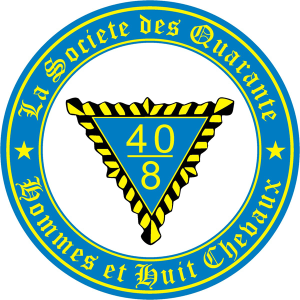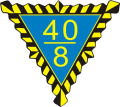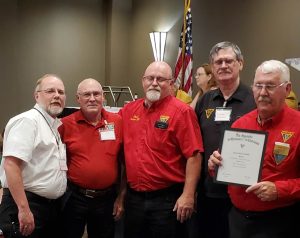 What is The Forty and Eight?
What is The Forty and Eight?
La Société des Quarante Hommes et Huit Chevaux (The Society of Forty Men and Eight Horses), is an independent, invitation only, honor society of American veterans and service members; more commonly known as The Forty and Eight. The Forty and Eight is committed to charitable and patriotic aims. Our purpose is to uphold and defend the Constitution of the United States, to promote the well-being of veterans, their widows, widowers and orphans, and to actively participate in selected charitable endeavors, which include programs that promote child welfare and nurses training. The titles and symbols of The Forty and Eight are derived from the experiences of U.S. troops during World War I. Americans soldiers were transported to the front on the French rail system. Cramped into narrow gauge boxcars, each stenciled with “40 Hommes/8 Chevaux”, denoting its capacity to hold either 40 men or 8 horses. This uncomfortable mode of transportation was familiar common experience for every Doughboy that fought in the trenches; a mutual small misery among American soldiers. Thereafter, they found “40/8” a lighthearted symbol of the deeper service, unspoken horrors and shared sacrifice that bind all who have endured combat. The Forty & Eight was founded in 1920 by American veterans returning from France. Originally an arm of The American Legion, the Forty & Eight became an independent and separately incorporated veteran’s organization in 1960. Membership is by invitation of honorably discharged veterans and honorably serving members of the United States Armed Forces.
About Voiture 1120
Voiture 1120 is a local charitable organization. We raise funds to support our sponsored programs such as our bi-annual nursing scholarships and youth sports. We fund these programs by conducting an annual butt sale and through donations from individuals and local businesses. The monies raised remain in the big bend area.
The Doughboy and the Boxcar

In 1917 when the first U.S. soldiers left for France they travelled in a variety of conveyances. Trains in the U.S. ranged in style from flatcars (that hitch-hikers were ejected from,) to Pullmans with drawing rooms, and fancy private coaches. But, all that changed when they arrived in France.
Everyone in France traveling by train rode in boxcars (voiture in French ,) whether they were animal or human. Each boxcar had the same capacity throughout France, so they all looked similar.
Upon loading into one, many a Doughboy would wonder at the same French words and same numbers that were painted on the exterior of each car.
“Wonder what that means?” a fellow from the rolling hills of the San Gabriel Valley might ask as he climbed in.
His Los Angelino buddy he had met at camp chuckled, “Must mean what the locals have to pay to ride. Good thing its free for us. I don’t even have a chevaux.”
“Here,” laughed another fellow from another little southern California town called Monte Vista (which would eventually be renamed Montclair,) “have one of mine,” and he pulled out a penny and tossed it to him.
From under the brim of his Montana Peak hat, a fourth Californian already sitting on the floor interrupted the fun saying, “Well I doubt that you could fit a chevaux in your pocket.”
“How do you know?” the insulted Monte Vistan snapped.

Raising his head, the Doughboy pointedly replied, “My Granddad was a gold-miner who came straight from Paris in 1849. He taught me to read French. You jokers got it all wrong. 40 Hommes/8 Chevaux means forty men and eight horses. I doubt you could hide a horse in your pocket.”WW1 American troops in a 40and8 French boxcar [Note the censoring on the boxcar to prevent enemy from gathering information.]
Without a doubt, it is certain that every infantryman in the A.E.F. (American Expeditionary Force) rode a 40 and 8 boxcar at least once. It was a well-appreciated mode of transport because the alternative meant sore feet, and wearing out a pair of shoes too soon since trucks and automobiles were uncommon. Thus, the Doughboys grew fond of the little boxcars.
Upon returning to the states in 1919, the soldiers of the United States founded the American Legion, and in the following year, an exclusive level of the new organization was formed consisting of officers of the new fraternity of ex-soldiers. It was named La Société des Quarante Hommes et Huit Chevaux (The Society of Forty Men and Eight Horses).
Its members were called Voyageurs Militaire (military travelers) and candidates for membership were called Prisonniers de Guerre (Prisoners of War). The cargo capacity sign “40 Hommes/8 Chevaux” emblazoned on each French boxcar that carried American doughboys to the front, and the “French Army horizon blue” color, became symbols of the new society. An initiation ceremony was developed based on the common wartime experiences of American soldiers, sailors and marines, incorporating fun-making with patriotic bonding.

